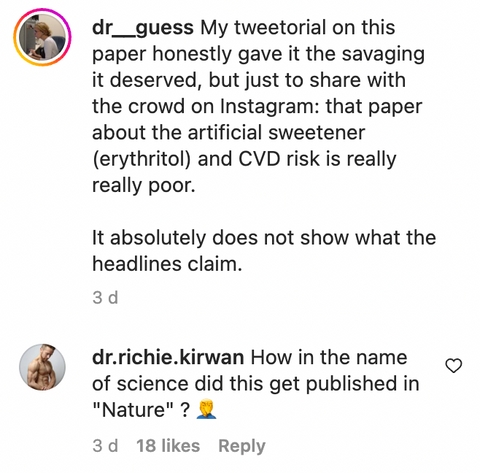The past week has seen alarm and concern about the safety of Erythritol after a study was published in the Nature Medicine journal seemingly linking Erythritol to cardiovascular risk. You can read the study here and below I will refer to this study as "Witkowski, et al".
My first sighting of this study was of a CNN article with a terrifying title:
CNN: Zero-calorie sweetener linked to heart attack and stroke, study finds
Skepticism
I am naturally a bit of a skeptic and especially skeptical of US media, which often appears to have a huge conflict of interest with advertisers. In fact, doctors and politicians also have very real conflicts of interest in the US.
That is not to say fact checking has not been done here, just that it warrants a deeper dive.
Savage Reviews
Other media outlets have come out in the aftermath with a more reasoned response. After reading this Time Magazine article I read the scathing review by Oxford University Doctor and well respected Dietician, Dr. Nicola Guess and her post on Instagram, shown in this screenshot:

I strongly recommend reading Dr. Guess' savaging comments here on her Substack site. You can even subscribe to her emails. [She also has a very good follow up article found here.]
Mike Mutzel at High Intensity Health, another YouTuber I watch from time to time also blogged with the critical headline:
Erythritol, Stevia and Heart Attacks: Media Botched Study Findings
Finally, and I think 3 opinions is enough for the purpose of this blog post, but this video from Keto guru Thomas DeLauer quoting US medical researcher Alan Aragon, may also be valuable. I transcribed Alan's comments here:
The Study Itself
Before I found the articles and feedback mentioned above, I had spent quite a bit of time reading the study and here are some points that I thought useful to consider:
- Serum Erythritol - As many readers will know, our bodies produce Erythritol naturally and it is present in many of our bodily fluids (known as serum Erythritol or endogenous Erythritol). This is what was studied, not "consumed' Erythritol.
- Association - The study was not designed specifically to prove any casual link between Erythritol and disease. It was found by accident. The study was not randomised either, which leaves it wide open to interpretation of causation and correlation.
- Disease Marker - Serum Erythritol (that found in bodily fluid) is known as a marker for cardiovascular disease and poor metabolic health, meaning that if someone has a high level of oxidative stress from a disease or poor metabolic health, then they will also have elevated levels of serum Erythritol. Back to that question of causation vs. correlation.
- Subjects - As per Table 1 in Witkowski et al, the group of subjects (n = 1157) were:
- Average age of 65
- 63% male
- Average BMI was 29.2 (classified as "overweight")
- Pre-existing conditions:
- Coronary artery disease (75%);
- Hypertension (72%);
- Myocardial infarction (46%);
- Only 8 subjects were defined as "healthy volunteers", which obviously has some impact on the results, as unhealthy subjects would be expected to have high levels of serum Erythritol!
Further Reading
There have been many studies over recent years seeking to determine the benefits and risks associated with Erythritol, both endogenous and dietary. Readers can do their own digging, but to provide context to this alarmist study, please take a look at these examples:
-
"Erythritol: An In-Depth Discussion of Its Potential to Be a Beneficial Dietary Component" by Nutrients: https://www.ncbi.nlm.nih.gov/pmc/articles/PMC9824470
-
"Science journals and weak science" Dr. Guess's Blog: https://drguess.substack.com/p/science-journals-and-weak-science
-
"Evaluation of the Antimicrobial Activity of Erythritol, Xylitol, and Stevia Extracts Against Streptococcus mutans Biofilm" by Journal of Dentistry: https://bmcmicrobiol.biomedcentral.com/articles/10.1186/s12866-020-01867-8
-
"Effects of Erythritol on Endothelial Function in Patients with Type 2 Diabetes Mellitus: A Pilot Study" by Nutrition and Diabetes: https://www.ncbi.nlm.nih.gov/pmc/articles/PMC4037362/
-
"Erythritol: an interpretive summary of biochemical, metabolic, toxicological and clinical data" in the National Library of Medicine: https://pubmed.ncbi.nlm.nih.gov/9862657/
Disclaimer
I should provide a disclaimer here that I am not a doctor nor a scientist, nor particularly adept at deciphering empirical literature, and as we sell Erythritol we have a pretty obvious conflict of interest.
All of that notwithstanding, after reading the study and listening to various commentators I think it fair to say that now and until determined otherwise, we feel comfortable that Erythritol is safe - as per the many hundreds of other studies conducted on actual consumption, and as per the US FDA's safety recommendations.
Apologies for the super lengthy post, but as I dug deeper and deeper on the study and the backlash, I just kept finding more things worthy of sharing. We hope this helps everyone to make up their own minds!


